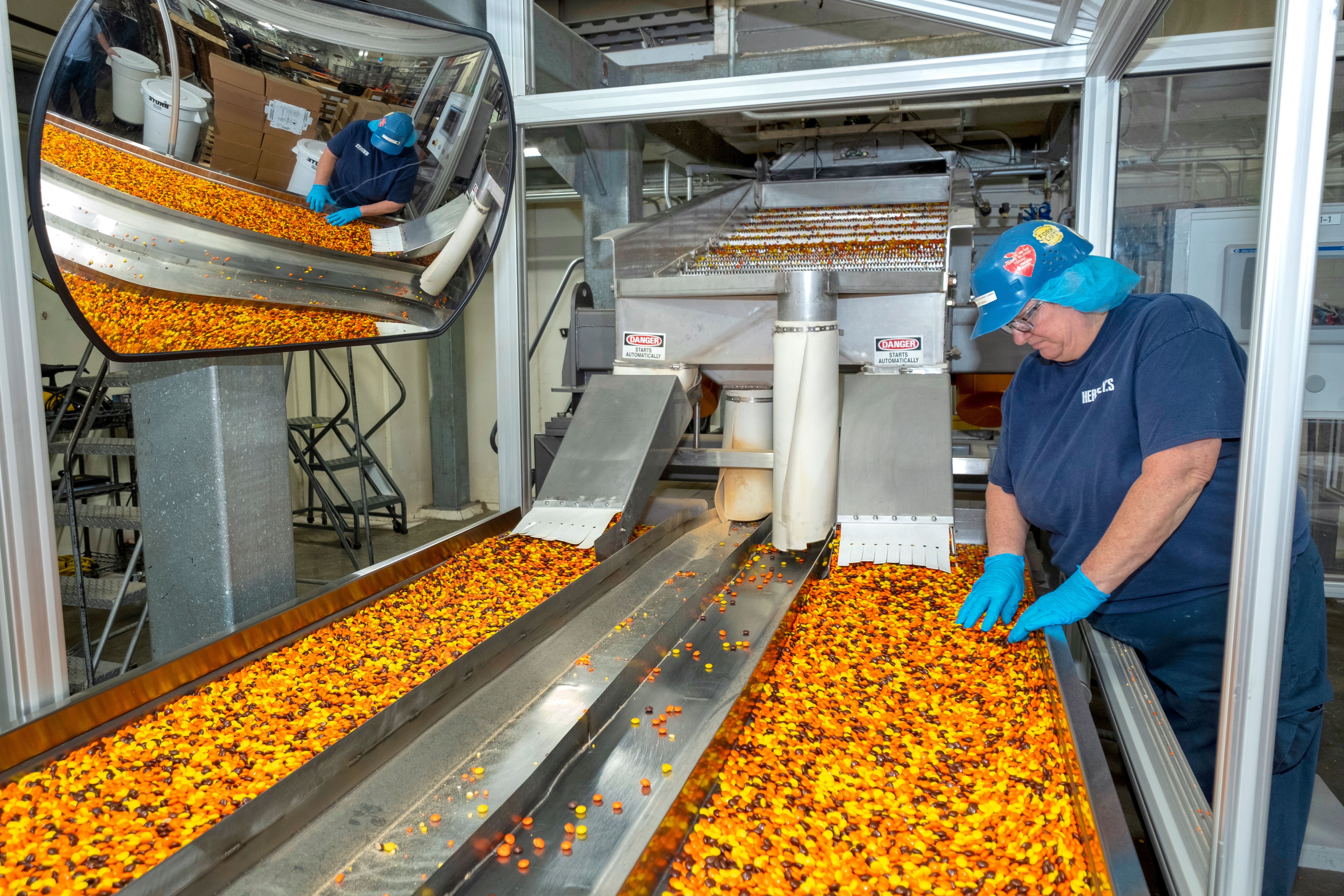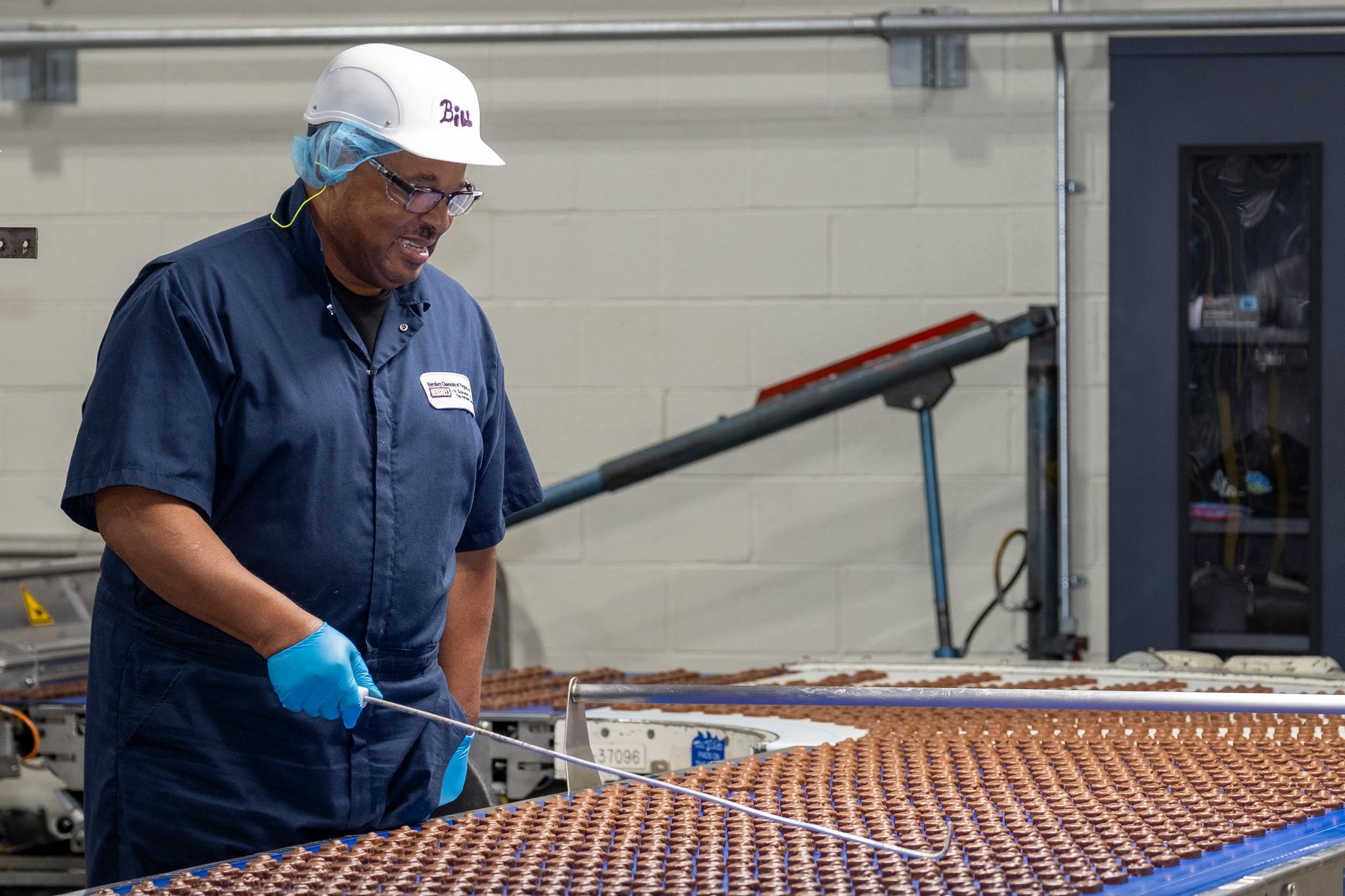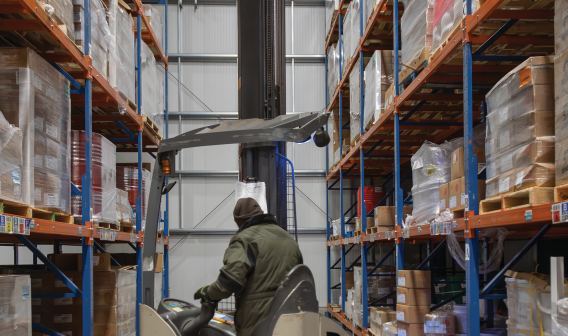A Sweet Boot Camp at Hershey's
In the spring of 2018, Kristen Wilson wanted to jump back into full-time work after spending several years at home with her two children. Friends who worked at the Hershey Chocolate of Virginia facility in Augusta County told the 34-year-old about a manufacturing boot camp the company planned to launch that June.
Wilson could earn an hourly wage while attending the two-week training program, where she would learn what it takes to work the machines that churn out Almond Joy and Mounds chocolates. If she did well, she might get brought on full-time, most likely for a spot working on the second or third shift.
Wilson decided to go for it. “I’d never thought about making candy all night, but it sounded like a lot of fun to me,” she said.
Finding the Right Fit
Hiring quality employees for positions working production lines often presents a challenge for human resources teams.
A low unemployment rate means a smaller talent pool to choose from, explained Christi Branch, a training coordinator for The Hershey Company.
It doesn’t help that careers in the industry are a tough sell for many recent high school graduates and their parents, according to Debby Hopkins, chief workforce officer and program director at Shenandoah Valley Workforce Development Board, a non-profit based in Harrisonburg that provides services for employers and career seekers.
“Everybody thinks their kids should go to college, whether they're suited for it or not,” she said.
People are starting to hear about [the boot camp]. They know that if they do well, it can be a shortcut to a great job at Hershey.
Those who do apply for manufacturing jobs often lack the required skill sets. “Because of automation, there’s quite a bit more technical understanding that has to be held by entry-level operators now than they ever needed before,” Hopkins said.
After some mulling, Hopkins hit on a solution. The workforce development board would launch a training program specifically designed to prepare workers to succeed on the Hershey production line.
Working with Hershey leaders, Hopkins set about trying to understand what helps production line workers do well at the job.
“They went to the line leaders,” Hopkins said of the Hershey employees working on the project. “They went to the supervisors and asked, ‘What makes people succeed and what makes them stay?’ We just kept talking and talking.”
Using financial assistance from the American Apprenticeship Initiative Grant from the U.S. Department of Labor, Hopkins designed a curriculum that would teach boot camp participants specifics about manufacturing, regulatory requirements, and safety, as well as soft skills, like what being punctual means at Hershey (being on the line, in uniform, 15 minutes before the start of the shift).
“When [the boot campers] walked out of there,” Hopkins said, “they understood what Hershey’s expectations were.”
Boot campers also get to spend time on the production floor at the facility — an essential element of the program as far as Branch is concerned.
“Manufacturing can be a little bit overwhelming and scary [at first],” she said. “It's a lot of equipment. It's a lot of noise.”
By getting a firsthand look at what the work is like, boot camp participants can decide whether or not it’s the job for them. “Most businesses are wanting as many bodies as possible,” Branch said. “We want somebody where it's a good fit for both of us.”
The program is geared toward recent high school graduates, individuals who are underemployed for any reason, and those with disabilities.
Staff from The Wilson Workforce Rehabilitation Center, an Augusta County nonprofit that helps individuals with disabilities, works closely with the workforce development board on the boot camp. Several clients from Wilson have completed the training program and gone on to work at Hershey, which has an initiative called Abilities First that recognizes the company’s commitment to hiring individuals with disabilities and making sure they have the support and training necessary to be successful.
“It’s a neat opportunity for our employees to work with a diverse group,” Branch said.
Building a Reputation
The first boot camp drew 11 participants, including Kristen Wilson. She and six of her fellow boot camp participants were ultimately hired by Hershey, and they were later accepted into Hershey’s Industrial Manufacturing Technician apprenticeship, an 18-month program where apprentices can receive on-the-job training and over 200 hours of instruction. Upon completion, apprentices receive a journeyman card.
It didn’t take long for word to spread. “People are starting to hear about it,” Hopkins said. “They know that if they do well, it can be a shortcut to a great job at Hershey.”
When organizers began advertising for a second boot camp held in June 2019, they had more than 200 interested candidates. After a robust screening process, 32 individuals were selected to attend the training. Of those, 21 became Hershey employees.
“You can just tell they’re so proud to get that full-time job,” Branch said of those who were hired.
In October 2019, 14 more candidates attended a third boot camp and all 14 were asked to come aboard at Hershey. “I am absolutely in love with the boot camp,” Branch said.
Hershey currently employs about 1,100 workers and plans to hire another 300 in 2020, according to Branch. In May, the company announced plans to invest $104 million to build a 111,000-sq.-ft. expansion which will include a Peanut Roasting Center for Excellence. To help with staffing, Hershey plans to hold one or two boot camps in 2020.
“We want a pipeline of people coming to us,” Branch said.
Bright Outlook
An employee who starts out on the production line at Hershey will likely have a chance to move up the corporate ladder. The company prefers to promote candidates internally to management positions and offers tuition reimbursement for those who want to go back to school, as well as apprenticeships for different career fields at the company. “We have huge opportunities here,” Branch said.
Wilson, who wants to retire from Hershey, hopes to one day be promoted to a team leader position. She’ll tell anyone who will listen that the boot camp is the best way to get a foot in the door at the company and that manufacturing is a great career.
“Don’t let it intimidate you. It’s not intimidating,” she said. “And if you get in, you do your job right, you work hard, it’s very rewarding.”






